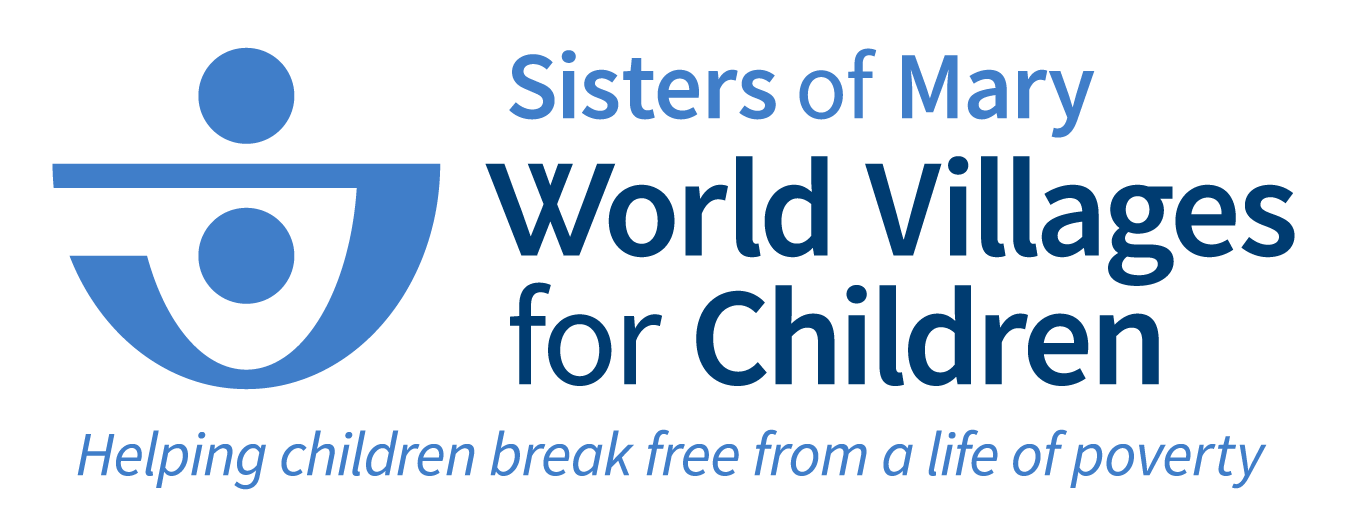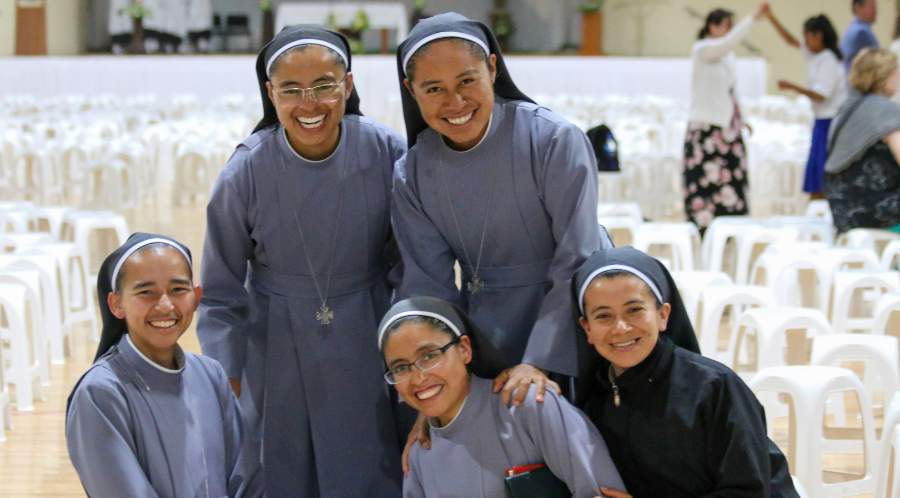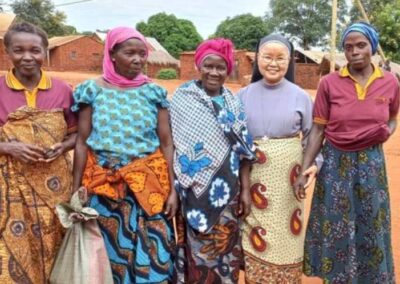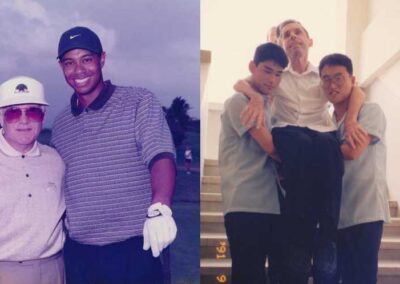The Sisters of Mary’s allegiance to five vows has made them one of the hardest-working religious communities in the world.
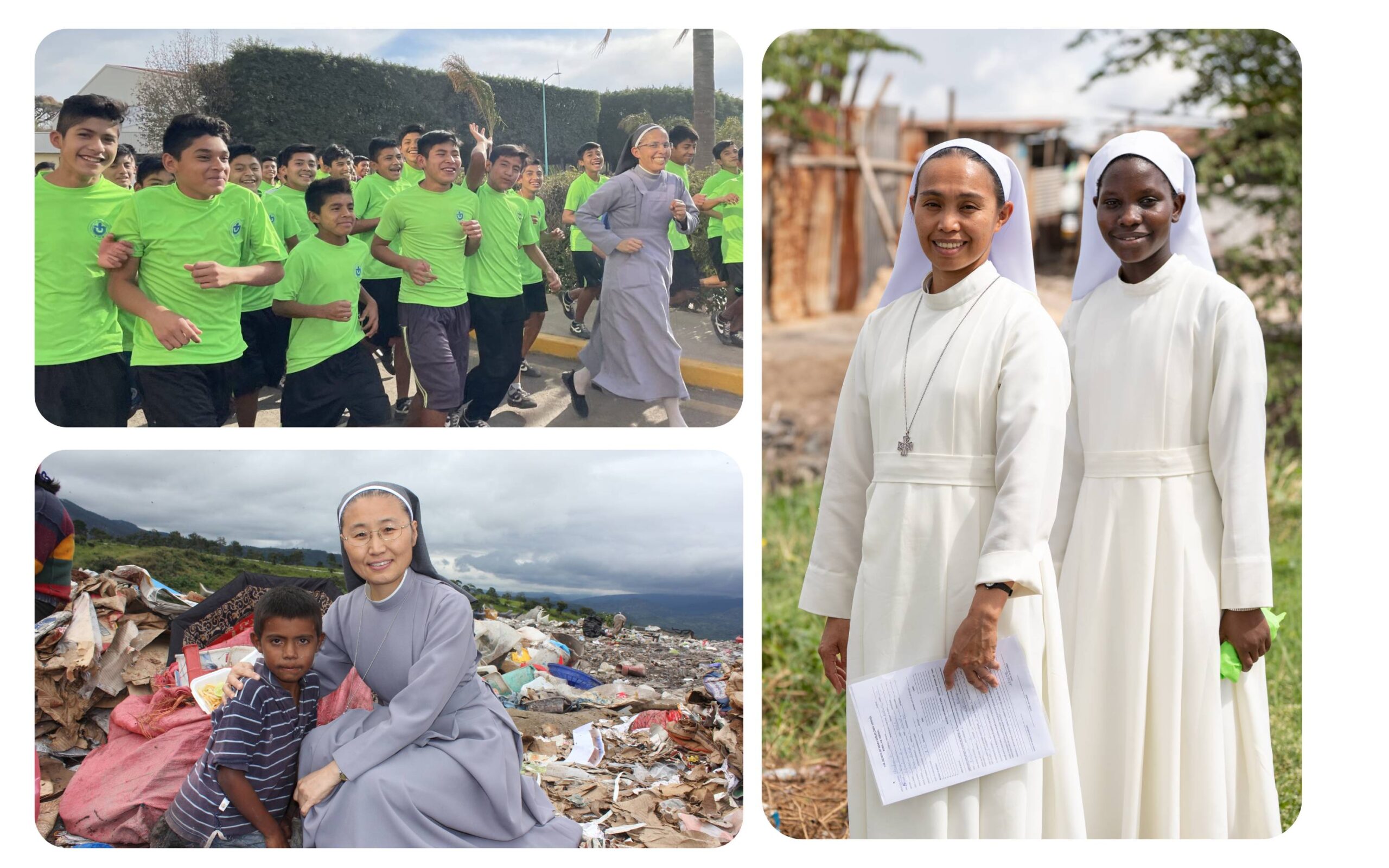
True Motherhood
Some thirty-three years ago, a young religious sister named Sr. Margie Cheong would join in the evening twilight with Venerable Aloysius Schwartz and a few other Sisters of Mary on a wide hacienda porch in Mexico. As the summery chirps of crickets took hold, they looked into endless acres of an old carrot field, wild sunflowers, and cacti, and discussed the future after Fr. Al’s death.
The sisters huddled close to catch every word from his fading voice; they knew a holy man was imparting thoughts that would soon become their blueprints. He was bequeathing spiritual heirlooms as precious as the rays of the setting sun. Imposing twin volcanoes in the distance seemed to eavesdrop on the discussion.
It was an amalgam of dreams, goals, and storytelling he shared as they looked upon the barren landscape that would soon become the home to tens of thousands of young children born into poverty.
If you were lucky enough to have been there on one of those warm nights, as Fr. Al’s body withered from the ravages of ALS, you would have listened in on a spiritual father placing demands of what true motherhood necessitated. You would have heard a priest, in effect, tell the sisters that their mothering demanded they wear a lifelong crown of thorns. If their work was to be efficacious for the poorest of the poor, he said, the children needed to see them willing to die for them. Sr. Margie remembers him telling them that their work demanded an identification with the crucified Christ. She recalled him softening when he spoke of his spiritual muse, St. Therese of Lisieux.
“Until the very end, Fr. Al taught and guided us. It was a time when he had trouble speaking – he often choked as he spoke, but even then, he was joyful and relaxed,” she said. “We were caring for him in very personal ways, but he kept joking and smiling. He told us, ‘You know, my whole life I’ve been trying to get away from the ladies, now I can’t keep you ladies away from me.”
Although he strove to keep things light-hearted, he turned deadly serious when reminding them of the promise of their five vows. If they committed themselves to the vows, their lives would resemble a nonstop prayer of sacrificial love and a continuous offering of crucifixion from their comforts.
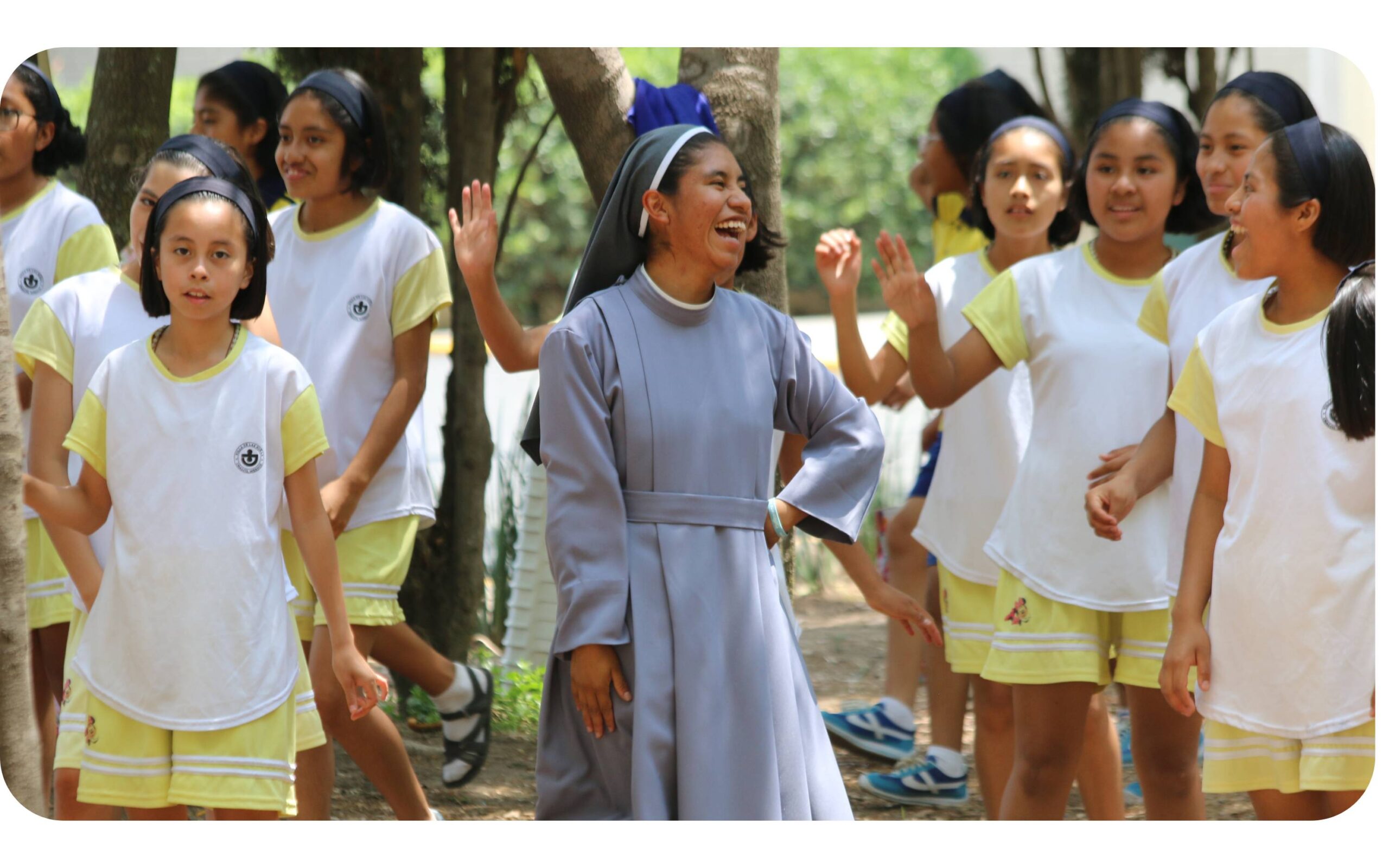
“God Calls. We Respond.”
The Sisters of Mary are one of the only religious community’s in the world to commit to five vows. The first line of the Sisters of Mary Constitutions – two sentences comprised of just four words – is humble and profound, as it lays down a gauntlet of their own making: God calls. We respond.
As their founder changed the world through the intercession of Mary, the sisters know it is their duty to try to do the same.
They define their mission and spirit very simply, like the humble mother behind the scenes constantly attuned to the needs of her children. We are poor in possession and disposition. We remain poor in the ways of the world and in the eyes of the learned. We attend to the poor as a preferential option with predilection. The simplicity of our religious vocation, of our spiritual formation, and our apostolic mission is the premise of the simplicity of the life we have as individuals in the life we live as a community. Our intentions are plain, our expectations are few, our requirements are little, so we can give more, do much.
There is nothing “simple” and “plain” about the startling effects of the Sisters of Mary religious community’s work. Since being founded by Fr. Al in Busan, Korea in 1964, more than 170,000 of the poorest teenagers in the world have graduated from fifteen authentically Catholic Boystown and Girlstown schools spread throughout the world like humble kingdoms of resurrection. The majority of graduates attend universities. They go on to run companies. They become teachers and bricklayers and run family farms. They are today’s auto mechanics, policemen, and dentists. They are lawyers, orchestral musicians, and architects.
Some enter seminaries and cloisters to become priests and nuns. Others move into parishes and volunteer as catechists, lectors, and spiritual big sisters and brothers to the poor. Thousands of them would be dead if the sisters hadn’t stepped into their oppressed villages—two-by-two—to pull them from the grip of traffickers, rapists, drug runners, gangs, and murderers.
As of this writing, there are 18,779 students in Brazil, Guatemala, Honduras, Mexico, Tanzania, and the Philippines.
It has been through their five professed vows of 1. Poverty, 2. Chastity, 3. Obedience, 4. Service to the Poor, 5. and Three Hours of Committed Prayer that the Sisters of Mary have become a countercultural force in the Catholic world and a source of hope for countless thousands of the most bullied children of the world.
What do these sisters resemble in the flesh? Let us take a closer look at just three of the 381 sisters.
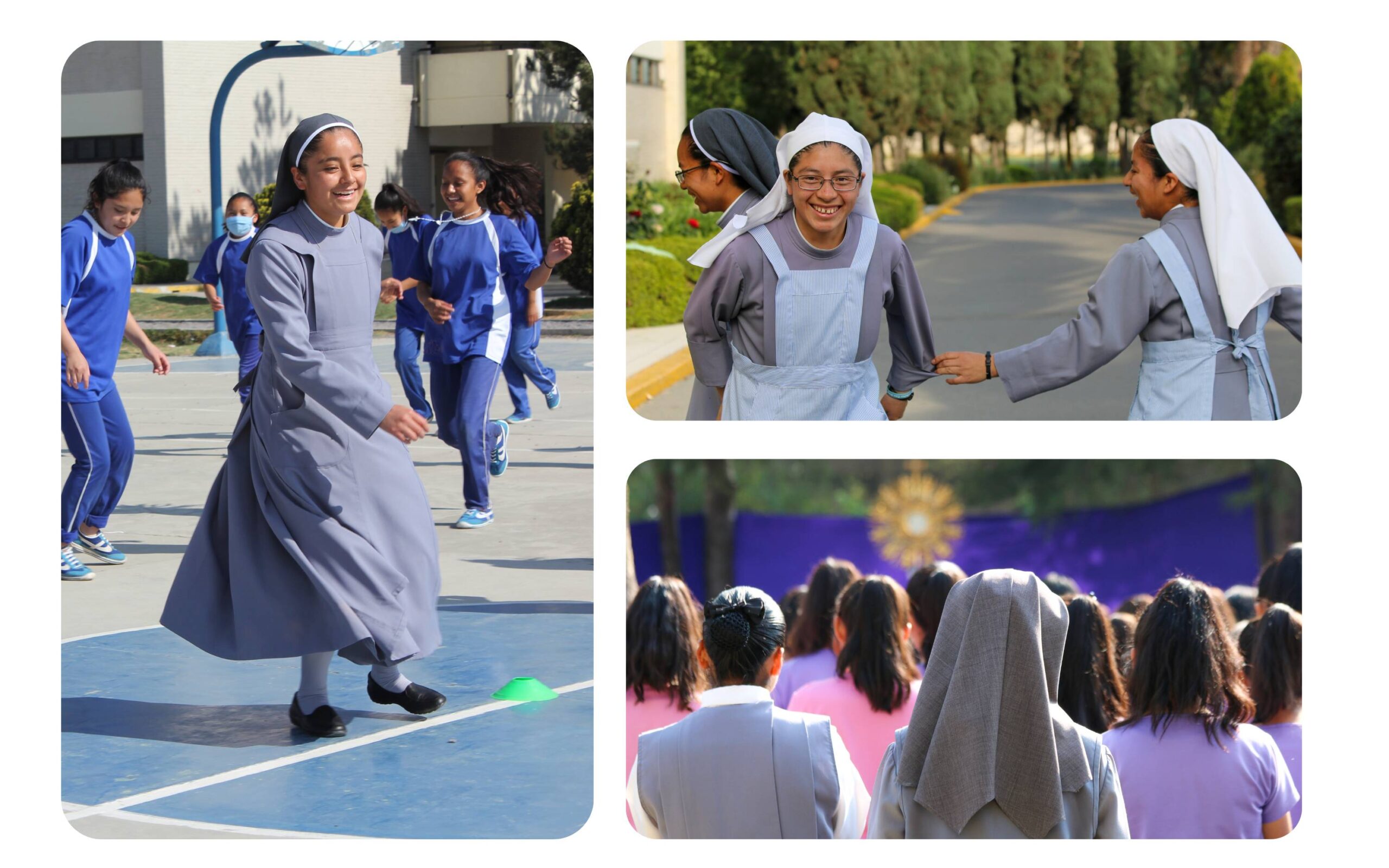
Sr Hortencia
Sr. Hortencia is a quiet Mexican-born sister who will walk into a room without you noticing. She’ll serve you a glass of water and you’ll forget how it reached your hand. She’s content to be the head of the rose whose head has snapped off.
You are forgiven if you overlooked that she is responsible for the souls of two thousand teenage boys at the Boysown community she shepherds in Guadalajara. Although she is as vital as any person in the world as Superior of the Boystown Community, she has found comfort in being completely forgotten.
“Because I grew up in a very poor town. I knew material poverty, but now I understand a different dimension of poverty,” she said in a soft voice. “As the eldest of nine children, I felt a pull to help my family out of their poverty. But feeding this other type of poverty [in the Sisters of the Poor] was stronger. These children pulled me to them.”
How does a meek and quiet woman direct a community of two thousand boys so seamlessly? “[The Virgin] Mary is the Superior and Director,” she said, echoing Fr. Al’s words. “I understand that, but on a human level, it was hard for me to grasp. It was a tense feeling handing it all over to Mary. I realized, though, that I could take care of nothing by myself. Mama Mary really is in charge. It finally began to set in with me.
“There are difficulties, but I’ve learned that all difficulties can be solved by following Fr. Al’s method. He always consulted with the Sisters and listened to different opinions. So that is what I’ve been trying to do.”
She has chosen to expose the Blessed Sacrament to the boys as often as possible, including on a recent canoe procession on a pond at the Boystown community. She knows if the boys don’t adore, draw strength, and come to know Jesus as a divine friend in Eucharist that their lives will become difficult and partly hollowed out. Sr. Hortencia looks each day into the faces of the boys who will help to evangelize a nation in which many have rejected their Catholic faith. And she knows the great Eucharistic force these boys can be in her native land.
“Mexico is the “unfinished symphony” of Fr. Al. And since I’m Mexican, it is important to me to try to carry out his dream the best that I can. The dream of Fr. Al is my own dream. It is all the Sisters of Mary’s dream.”
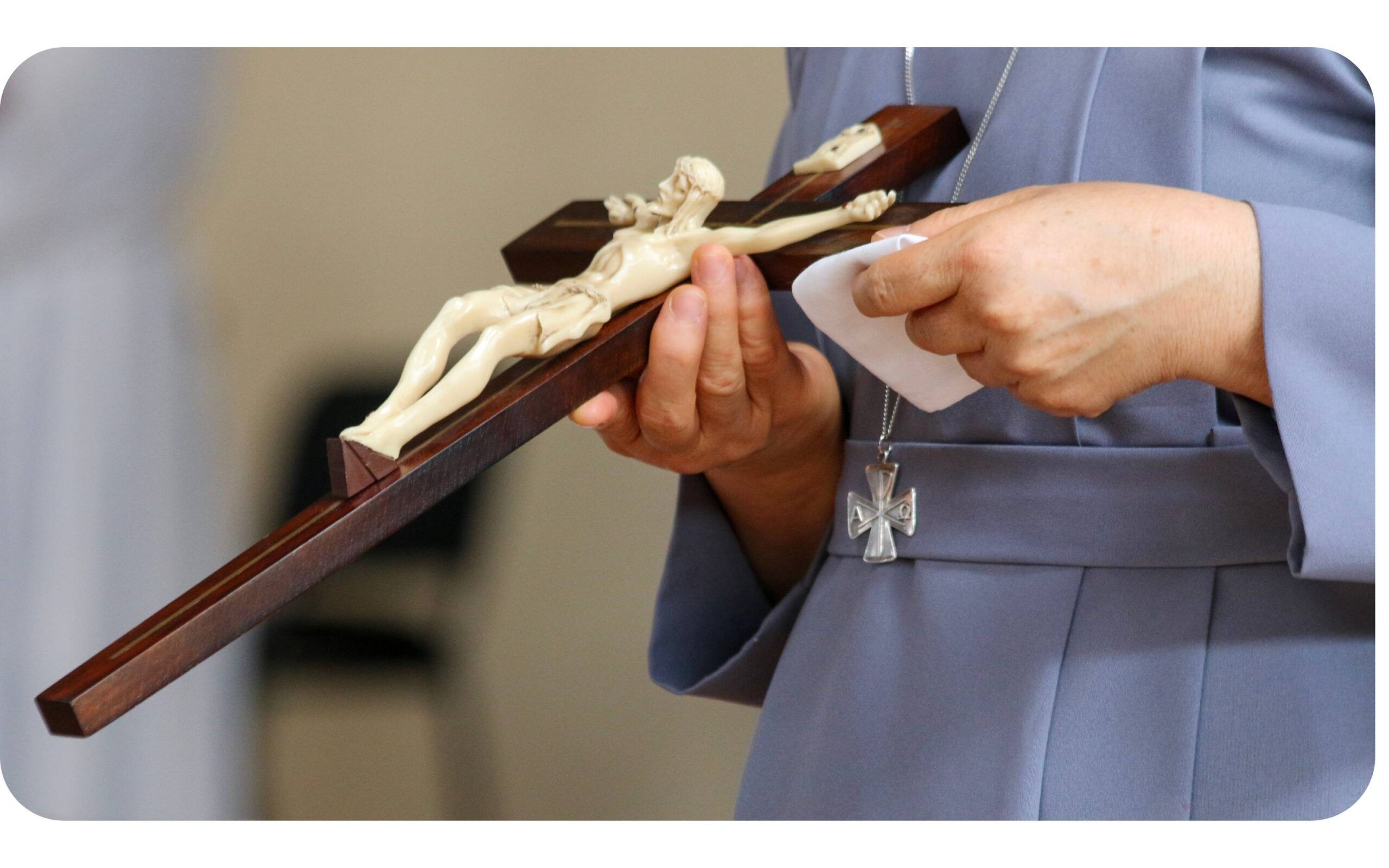
Sr. Marinei
Someone asked Sister Marinei (pronounced Mar-en-ae), a 43-year-old sister from Brazil, what she had yet to die to. Her hesitant eyes told distinctly different stories: her self-consciousness at being caught in the teeth of a perceived weakness and of her desire to fully expose it. The distant barks of dogs that evening seemed to grow louder.
Finally, she said – “I am sensitive,” she whispered with the awkward smile of a kindergartner at her first picture-taking. “And I know I must give that up, too. My thoughts, my hurts – it is all nothing. I must die to everything to be filled with Christ.
“To live poverty means that I must accept a certain death … now, it is not easy for me [Sr. Marinei laughs as the tension in the room loosens], but I know I need to die several times a day. I need to leave behind everything that I am.”
Sr. Marinei is an aberration, like the odd black sheep within a flock of ivory-white flocks. In a sense, she is not one of them, meaning the cheery-eyed Sister didn’t come up within the ranks. More than 90 percent of the Sisters of Mary congregation are former students and long-time members of the community. So in a way, St. Marinei is a humble, dimly-lit star in Guadalajara.
The work of the Sisters is extraordinarily difficult; most aspirants from the outside simply fade away at some point in formation. But Sr. Marinei stuck. Her desire to suffer for the poor became more powerful than her desire to quit.
From the very beginning of her life in her small central Brazilian village of Niquelandia, she pushed onward when others warned her to slow down. “I explored other communities [of Sisters]; the Oblates, the Franciscans, and some others, but when I learned that the Sisters of Mary served poor children, I wanted to go that way,” she said. “When two Sisters visited me at my church one day to invite me, I was told by my [pastor] to relax. That all of this needed to be discussed, that it wasn’t good to go so fast.”
Her parents, friends, and family members shared the priest’s concerns. Finally, Sr. Marinei reached out to her local ordinary, Bishop Agostinho Marochi. He smiled – Marinei – you go to the poor children.
“So I went … but even if he said ‘No’ like the rest, I think I would have gone,” she said in an explosion of laughter. “The Sisters of Mary are different from every other congregation. I knew when I left to join them that I also had to leave my family and friends behind.
“But that is the Gospel – I leave everything – mother, father, all that I have. This is what Jesus asks of me. It is difficult, but these difficulties are great gifts. Because they allow me to offer myself fully to Him.”
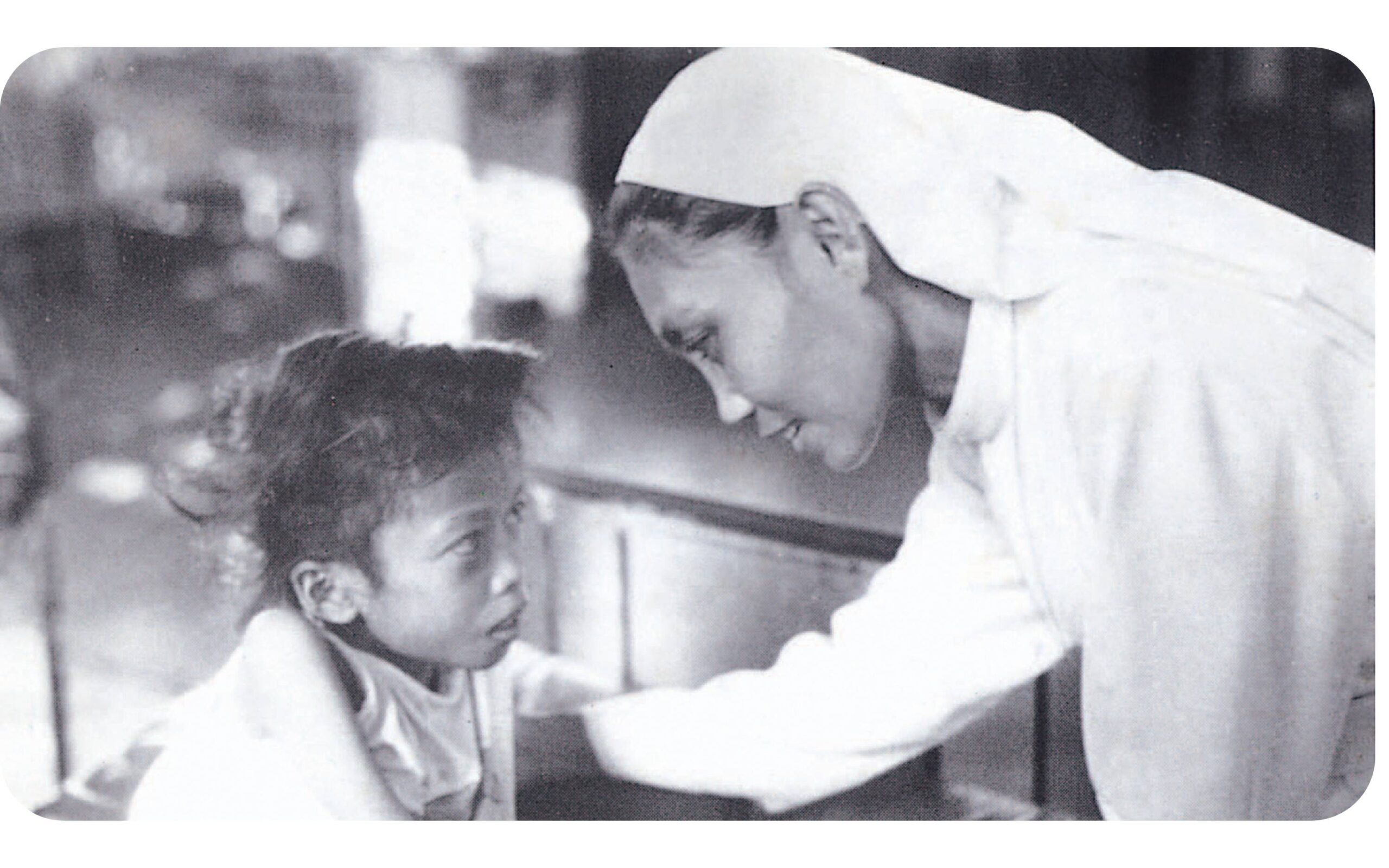
Sr. Elena
In March of 2023, the Sisters of Mary elected Sr. Elena Belarmino from the Philippines as their new superior general, a woman who overnight became the custodian of nearly 20,000 souls. She succeeded Sr. Maria Cho, who served for two successive six-year terms (twelve years). Sr. Elena will serve as Superior until 2029, and although she is excited about the future of Boystown and Girlstown communities, she knows it will demand hard work in light of tenuous global markets and economic uncertainty.
“Without the manpower and the funds, we, too, cannot accomplish our apostolate, though we believe God will provide if we continue to do our best,” she said. “God’s love and mercy and the maternal care of our Mother, the Virgin of the Poor, have made us grow as a congregation – and also with our apostolate. Without them, we could not survive, as there are always difficulties along the way – and besides, our work is enormous.
“We believe that Fr. Al is true to his promise of coming down to help us. He was never the type of priest who just sat at the desk; he was always moving – so now he is more active, seeing the weakness of all of us, his daughters. We are grateful for this blessing.”
As for her own leadership role, Sr. Elena speaks in the humble tone of one formed in the faith of Jesus Christ, the Poor Man of Nazareth.
“I am just one part of the many members of this community to share in this salvific mission of Christ. It is truly a privilege,” she said. “The good fruits coming from our service are amazing to me. The Lord could have given this mission to the learned, the highly educated, or the well-prepared – but no – he chose the weak and “the trying-hard” Sisters to do the work. This amazes me and proves that in weakness, Jesus shows His power. Daily the Lord unveils the greatness of His love through our mission and what we have given our life to doing.”
